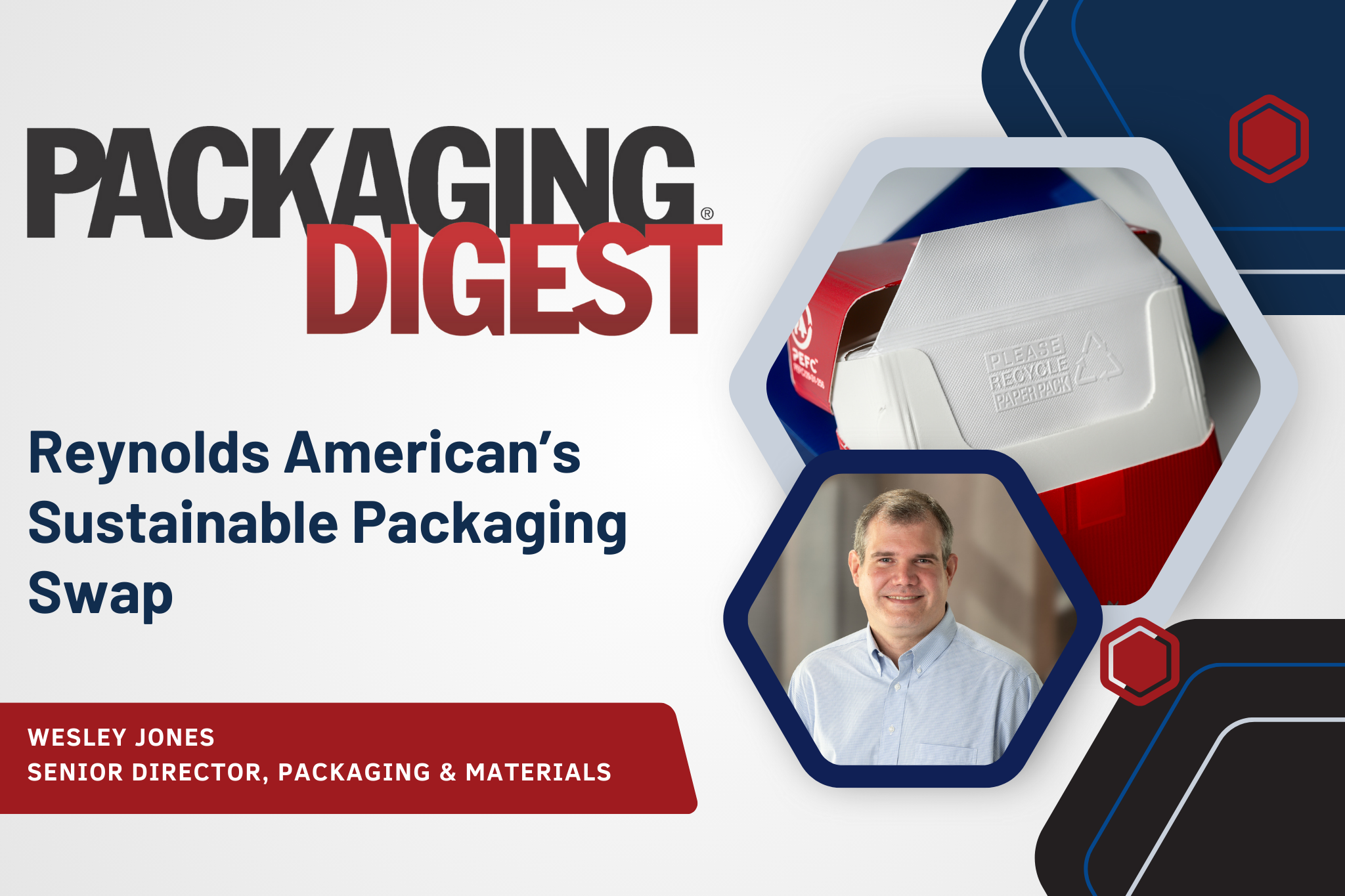At Reynolds American Inc. (Reynolds American), a circular economy means innovating to use fewer resources, create less waste, and reuse and recycle products to create a self-sustaining ecosystem of materials.
In the recent Packaging Digest article, Wesley Jones, Senior Director, Packaging & Materials; Laya Horton, Director, Packaging Development; and Michael Davis, Master Scientist, Materials Development, speak to the initiatives we have underway to make our packaging more sustainable.
Read the original article on Packaging Digest by visiting Reynolds American’s Sustainable Packaging Swap (packagingdigest.com).
Keep reading to find a copy of the full article below.
———————————————————————————————————————
Reynolds American’s Sustainable Packaging Swap
Swapping packaging materials and design components increases portfolio packaging recyclability and decreases virgin resource use.
By Wesley Jones, Senior Director, packaging & materials at Reynolds American
At a Glance
- A packaging change by R.J. Reynolds Tobacco Co. was key to parent Reynolds American topping 90% recycle-ready packaging.
- Reynolds American’s plan to ‘Build a Smokeless World’ with new product entries will bring new circular economy challenges.
- The company is collaborating with key suppliers to find packaging solutions and inspire future innovation.
Reynolds American is championing circular economy principles by swapping and reducing product packaging materials to increase recyclability and reduce use of virgin materials. The packaging trades have resulted in over 90% of the packaging in the Reynolds American organization’s portfolio being recycle-ready and the use of fewer finite resources.
One fundamental substitute has been critical to achieving this milestone: swapping the foil inner bundle in most R.J. Reynolds Tobacco Company (RJRT) cigarette packs.
In the previous packaging used by RJRT, foil-lined paper was incorporated inside a paper box. The recent switch substitutes the inner bundle with paper, instead of a foil-paper lamination, thereby making both the liner and box paper-based and increasing recyclability. All packs are enclosed in a polypropylene wrap for benefits such as product freshness to maintain a consistent product experience. This wrap must be removed by the adult consumer prior to recycling.
“This is a significant packaging advancement for Reynolds American given that R.J Reynolds Tobacco Company is the organization’s largest operating company. Not only was the conversion to a paper liner the right thing to do for the planet, but it also makes sound business sense,” said Laya Horton, director, packaging development, with the Reynolds American organization.
The new RJRT packs continue to be made from paperboard certified by the Programme for the Endorsement of Forest Certification, advancing sustainable forest management. Furthermore, 95% of cigarette packs across the portfolio are labeled to educate adult consumers on proper waste disposal and recycling.
The paper-based packs have begun appearing on retail backbars across the country and will continue rolling out through the year.
A ‘Smokeless World’ brings challenges & solutions.
New category products that support our vision to create “A Better Tomorrow” by “Building a Smokeless World” rely on different resources, presenting unique challenges in sourcing materials, production, and responsible disposal. Our operating companies are consistently working to improve circularity and to create less overall waste.
For example, previously, R.J. Reynolds Vapor Company reduced the use of virgin plastics by removing the polypropylene outer wrap on Vuse Alto Pod and Power Unit vape products, helping to keep approximately 165,000 pounds of plastic out of landfills. But the company didn’t stop at removing the plastic wrap, as Alto’s packaging is also made of 100% recycle-ready cardboard. While we are proud of this progress, we recognize that there is still work to be done to fully integrate sustainable practices and improve circularity.
The polypropylene wrap removal for Vuse Alto Pod and Power Unit has been completed, and the updated packaging is available nationwide.
“We are continuously researching and developing innovative ways to simplify our packaging to lessen our material use. Where able, removing packaging materials that do not affect the product’s quality or adult consumer experience, is a great stride forward in minimizing Reynolds American’s environmental impact,” said Michael Davis, Master Scientist, Materials Development with the Reynolds American organization.
These packaging swaps support Reynolds American’s circular economy strategy, which encompasses the organization’s commitment to simplifying packaging to improve recyclability, and to reduce the use of virgin materials and finite resources. RJRT’s foil-to-paper improvement additionally supports the organization’s goal of having 100% recycle-ready packaging by 2025.
Circular economy efforts continue.
Despite design advancements aimed at increasing the recyclability of packaging, infrastructure to recycle many technically recyclable materials remains largely unavailable. Addressing this gap is essential to fostering a circular economy with a self-sustaining ecosystem of materials.
Like many other consumer goods organizations, Reynolds American faces ongoing challenges in sourcing and identifying food-grade alternative materials to achieve 100% recycle-ready packaging. In response, the organization recently hosted its inaugural Supplier Sustainability Summit at its largest manufacturing facility, the Reynolds Operations Center outside Winston-Salem, North Carolina. The two-day event brought together senior leaders and sustainability experts from top key suppliers, underscoring their essential role in Reynolds American achieving its sustainability ambitions. By collaborating early and closely with suppliers, the Reynolds American organization aims to leverage its expertise and capabilities in the development of additional innovative packaging solutions.
“Reynolds American was really successful in bringing multiple suppliers from different areas together and the discussions were really fruitful,” said Diogo de Almeida, regional sales director at Amcor, a key packaging supplier to Reynolds American. “We all have things that we can learn from Reynolds American and hopefully collaborate towards achieving fantastic results in the future for the planet and for all of us.”
Reynolds American portfolio products and packaging are subject to extensive regulation, which substantially limits product and packaging changes. All product and packaging changes are implemented in compliance with all applicable regulations.
Learn more about our packaging environmental sustainability initiatives by visiting our website at www.reynoldsamerican.com/product-stewardship/.

